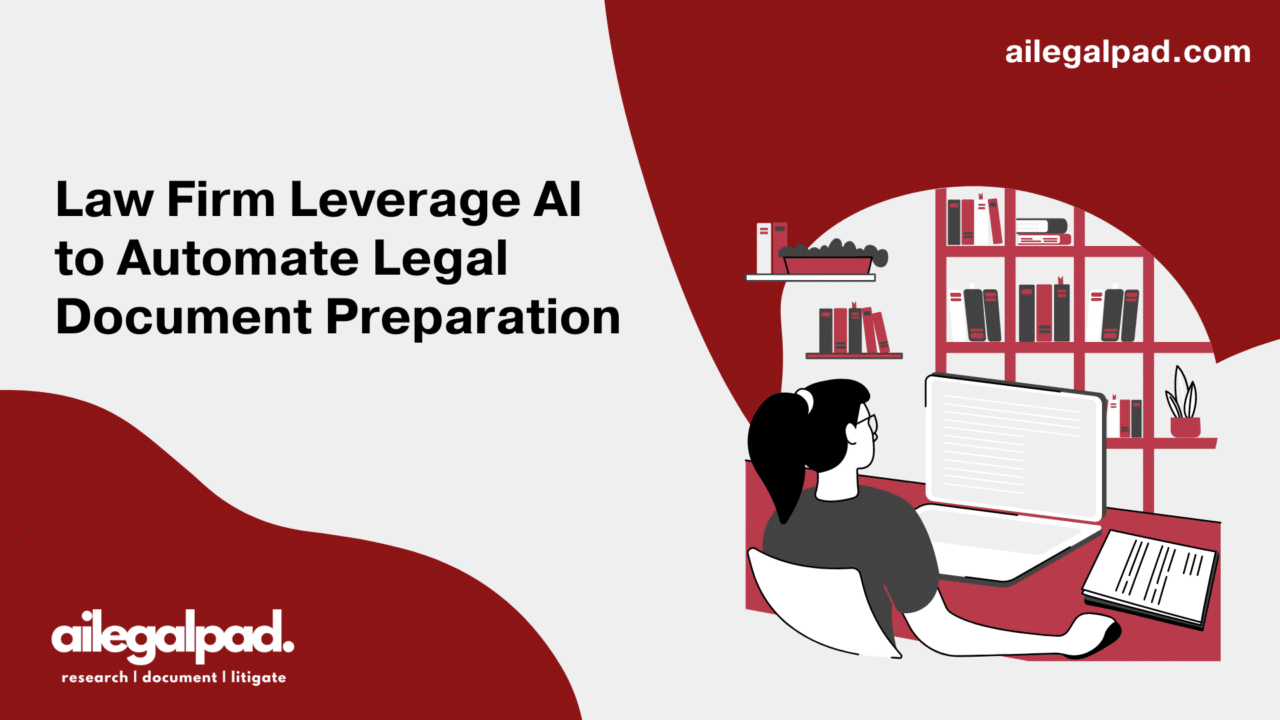Law Firm Leverage AI to Automate Legal Document Preparation.
Law Firm Leverage AI to Automate Legal Document Preparation.
You know the importance of reliable and effective legal document preparation as a lawyer. Generating contracts manually, applications, or other documents related to client cases can be time-consuming.
AI-driven software is revolutionizing this process for law firms by automating complex document creation tasks faster and more accurately. With AI-enabled document automation solutions, firms can reduce processing time while increasing efficiency across their entire team.
In this article, we’ll explore how law firms are leveraging artificial intelligence to automate legal document production – from creating new documents on demand to streamlining existing forms and templates – as well as ways that this technology can improve your practice’s workflow and create better outcomes for both clients and lawyers alike.
The process, ensuring accuracy and compliance while saving valuable time for preparing legal documents:
How AI is Helping Law Firms Become More Productive

The legal industry is slowly adopting artificial intelligence (AI) technology. This is because the technology artificial intelligence has revolutionized the practice of law. The potential to automate many time-consuming and repetitive tasks that lawyers typically do, such as legal research, document review, and drafting.
Here are some of the ways that AI is benefiting law firms:
- Automating tasks: AI can automate many tasks that lawyers typically do, freeing their time for more strategic and high-value work. For example, AI can be used to:
- Conduct legal research
- Review and analyze documents
- Draft contracts and other legal documents
- Manage case files
- Improving accuracy: AI can help improve legal work accuracy by identifying errors and inconsistencies. For example, AI can be used to:
- Flag potential legal risks in contracts
- Identify typos and grammatical errors in documents
- Spot inconsistencies in case files
- Ensuring compliance: AI can help law firms to ensure compliance with regulations and best practices. For example, AI can be used to:
- Monitor compliance with contract terms
- Identify potential conflicts of interest
- Stay up-to-date on the latest legal developments
How AILegalPad Can Help
AILegalPad is a cloud-based AI platform that can help law firms automate the process of preparing legal documents. AILegalPad uses AI to:
- Generate legal documents from templates
- Identify and correct errors in documents
- Stay up-to-date on the latest legal developments
- Help lawyers focus on more strategic and high-value work
AILegalPad is a valuable tool for law firms of all sizes. It can help to save time, improve accuracy, and ensure compliance. AI revolutionize the practice of law by making it more productive.
What is AI, and how is it being used by law firms
Artificial intelligence, or AI, refers to the ability of machines to mimic human cognition. AI automates repetitive tasks in the legal industry, such as document review and contract analysis.
AI-powered software can quickly and accurately analyze large data sets to identify relevant information and save lawyers time and money. Additionally, AI can assist with legal research, predict outcomes based on previous cases, and even generate legal briefs and documents.
The use of AI by law firms is revolutionizing the practice of law and allowing lawyers to work more efficiently and effectively than ever before. We expect AI to play an increasingly important role in the legal industry as technology advances.
Benefits to lawyers of using automated document preparation services

In today’s fast-paced legal industry, lawyers must catch up on tedious document preparation tasks. However, with the advent of automated document preparation services, lawyers have an efficient solution at their fingertips.
By utilizing these services, lawyers can enjoy many benefits, including increased productivity, reduced errors, and substantial time savings. With automated document preparation, lawyers can streamline their workflow, leaving more time for high-level tasks and delivering high-quality legal services to their clients.
Moreover, these services allow lawyers to manage their caseload more effectively, ensuring that documents are completed accurately and efficiently. Ultimately, automated document preparation is a tool that every lawyer should consider incorporating into their practice.
What services are offered through automated document preparation
Automated document preparation has revolutionized the way businesses and individuals manage their paperwork. With the click of a button, documents are easily created, formatted, and updated. But what services are offered through this system?
The possibilities range from formatting and editing tools to pre-written contracts, leases, and more templates. One of the most significant benefits of automated document preparation is the time saved. Rather than spending hours formatting a document, an individual can quickly create a professional-looking piece in minutes.
Plus, because templates are pre-written, there is a reduced risk of errors or mistakes in the final document. Automated document preparation is a boon for those looking to streamline their document processes.
Potential pitfalls to watch out for when using automated document preparation
Automated document preparation can be a great way to save time and improve efficiency, but it’s important to be aware of potential pitfalls when using this technology. One of the biggest concerns is accuracy – ensuring the automated system produces correct and up-to-date documents.
Another issue to watch out for is consistency, especially when dealing with large volumes of documents that may need to adhere to specific formatting guidelines.
Finally, ensuring that the automated system is secure and confidential information is protected is important. By being aware of these potential pitfalls and taking steps to address them, businesses can fully leverage the benefits of automated document preparation while minimizing the risks.

Examples of successful cases where AI was leveraged for document preparation
With the rise of artificial intelligence (AI) technology, there have been several successful cases where AI has been used to prepare documents efficiently. A noteworthy example is the legal industry, which involves handling many documents daily, and document preparation is a time-consuming process for lawyers and paralegals.
However, AI has revolutionized this process by automatically extracting relevant data from legal documents such as contracts, permits, and patents, helping lawyers analyze and prepare relevant documentation faster and more accurately.
Additionally, AI-powered document preparation can reduce costs and optimize efficiency in several other industries. Overall, these success stories demonstrate the advantages of AI in document preparation and its potential to transform workflows across various sectors.
Traditional Legal Document Preparation Vs. AI-Driven Methods
Traditional Legal Document Preparation
Traditional legal document preparation involves manual drafting by legal practitioners. It requires high expertise, extensive research, and a thorough understanding of the legal framework.
Skills Required
- Legal Knowledge: Profound understanding of law, legal terminology, and procedures.
- Research Skills: Ability to conduct comprehensive research on case laws, legal principles, and regulations.
- Writing Skills: Proficiency in drafting clear, concise, and legally sound documents.
Time & Cost
The time taken to prepare a document varies depending on its complexity. A simple contract may take a few hours, while more complex documents like wills or lease agreements could take days or weeks.
The attorney’s hourly rate largely determines the cost, which can range from $100 to $1000 per hour.
AI-driven Legal Document Preparation
AI-driven legal document preparation leverages Artificial Intelligence to automate legal document drafting.
Capabilities & Features
- Template-based Document Creation: AI platforms have pre-designed templates for various legal documents. Users fill in specific details, and the AI generates the document.
- Legal Research: Some AI platforms can conduct legal research, pulling relevant case laws and regulations.
- Review & Editing: AI can review and edit documents, identifying potential legal issues and suggesting improvements.
Accuracy, Efficiency, & Cost
AI-driven tools are highly efficient and capable of generating documents in minutes. Their accuracy depends on the quality of the AI model and the data used to train it. While not infallible, they offer a high degree of accuracy.
Using an AI platform can be significantly lower than hiring a lawyer, with prices typically subscription-based.
Comparison & Recommendation
Both traditional and AI-driven methods have their pros and cons. Traditional methods offer personalized service and human judgment but are time-consuming and expensive. AI-driven methods are fast and cost-effective, but they lack the nuanced understanding of a human lawyer.
AI-driven methods are excellent for companies seeking time-efficient and cost-effective legal document preparation. They offer a quick, affordable solution for standard legal documents.
However, traditional legal services might still be necessary for more complex legal matters requiring deep legal expertise and strategic advice.
In conclusion, a hybrid approach that combines AI’s efficiency with human lawyers’ expertise could offer the best of both worlds. This approach allows companies to leverage AI for routine tasks while relying on human expertise for more complex legal issues.
The Transformative Power of Generative AI in the Legal Industry
In an era marked by rapid technological advancements, one tool stands out for its potential to revolutionize the legal industry – generative AI.
This cutting-edge technology, developed by Google among other tech giants, is reshaping how legal experts work, driving efficiency, reducing costs, and improving accuracy.
Understanding Generative AI
Generative AI refers to systems capable of generating new content from existing data. It uses deep learning algorithms to analyze vast datasets and learning patterns and generate outputs based on its learnings.
In the context of the legal industry, this means creating legal documents, conducting case law research, and even predicting case outcomes.
Practical Applications of Generative AI in the Legal Industry
Document Drafting and Review
Generative AI significantly reduces the time and effort required to draft legal documents. The AI can generate second drafts by analyzing templates and previously drafted documents.
This saves time and minimizes human error, ensuring greater accuracy and consistency.
Legal Research
Legal research is an integral part of legal practice. However, it’s a time-consuming task that involves sifting through vast amounts of information.
Generative AI simplifies this process by rapidly analyzing extensive databases of legal texts and providing relevant case laws and regulations.
The Benefits: Time Efficiency, Cost Reduction, and Improved Accuracy
The use of Generative AI in the legal industry presents numerous benefits. First, it saves time. Tasks that would take hours, if not days, can now be completed in a fraction of the time.
Second, it reduces costs. Law firms can handle more cases with faster turnaround times, increasing their profitability.
Finally, it improves accuracy. The AI’s ability to learn from vast datasets allows it to generate precise and consistent results.
Expert Opinions and Statistics
Industry experts are optimistic about the transformative potential of generative AI. Grace Chediak, a leading voice in legal tech, asserts, “Generative AI is not just a new technology; it’s a game-changer for the attorneys”.
Additionally, a report by LexisNexis suggests that generative AI could reduce the time spent on routine tasks by up to 50%.
The Future of Generative AI in the Legal Industry
While generative AI holds great promise, it’s essential to remember that it’s not a replacement for human expertise but a tool to augment it.
As a Forbes contributor, Mark Cohen says, “The legal industry is evolving rapidly, and generative AI will play a transformative role in this evolution. But combining human expertise and AI will truly drive the industry forward.”
Integrating generative AI into the legal industry is no longer a matter of if but when. While there are ethical considerations and challenges to address, the potential benefits of this technology make it an exciting prospect for the future of the legal practice.
Conclusion
AI is a powerful tool that can benefit law firms in many ways. By automating tasks, improving accuracy, and ensuring compliance, AI can help law firms save time, improve efficiency, and provide better client services.
In addition to the benefits mentioned above, AI can also help law firms to:
- Identify new business opportunities
- Provide better customer service
- Make better decisions
- Stay ahead of the competition
AI technology will likely play an increasingly important role in the legal industry as it develops. Law firms that embrace AI will be well-positioned to succeed in the future.
Artificial intelligence (AI) is transforming the legal industry, providing unprecedented opportunities for law firms to streamline processes, increase efficiency, and reduce operational costs.
With AI, law firms can automate various tasks, from document review to contract analysis, allowing legal professionals to focus their time and energy on higher-value work.
Additionally, AI-powered solutions can quickly sort through vast amounts of data and provide actionable insights, enabling legal teams to make informed decisions faster.
By harnessing the power of AI, law firms can simplify the complex and often time-consuming legal process, providing greater value to their clients and positioning their businesses for long-term success.

